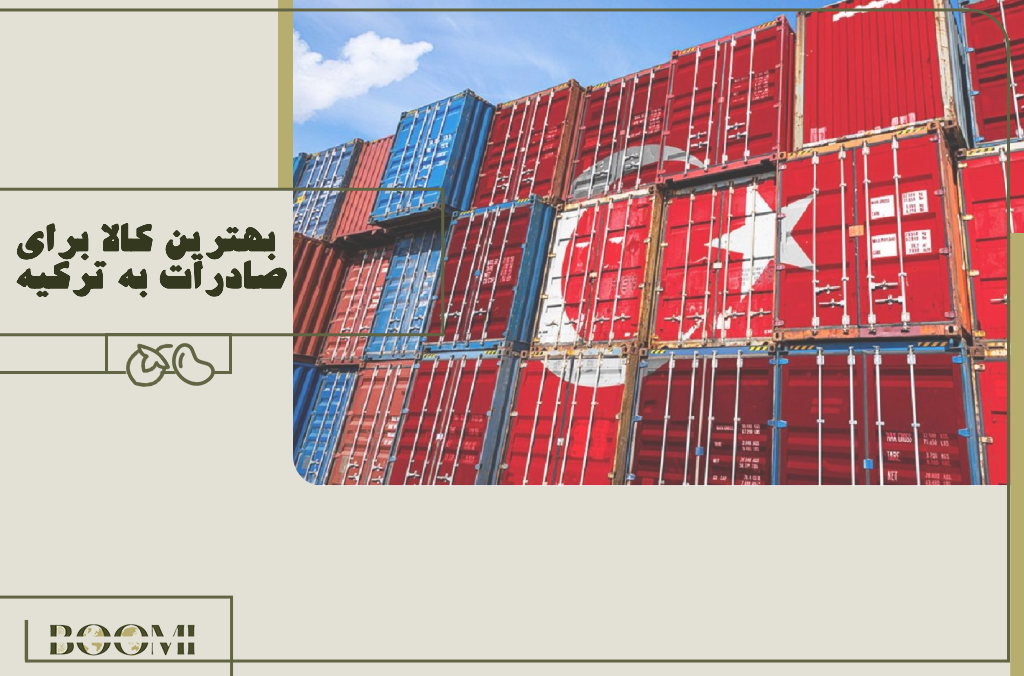Turkey, as a developing economy, is one of the most important destinations for exporting goods from Iran and other countries. Due to its strategic geographic location, large market, and favorable trade relations with Europe and Asia, this country provides great opportunities for exporters. To succeed in exporting to Turkey, it is crucial to understand the best products and goods suitable for this country’s market.
Additionally, Iran’s exports to various countries, especially Turkey, have created significant opportunities in the global market. The article on the best export products from Iran can help you identify high-quality and profitable products. Given the needs of the Turkish market, products such as saffron, dried fruits, and petrochemical materials are suitable options.
In this article, we will examine the profitable products for export to Turkey. Additionally, we will provide a detailed analysis of the Turkish market and its needs to help you increase your profitability by making the right product choices. From Iranian saffron and dried fruits, which are highly popular in the Turkish market, to petrochemical materials and industrial products, each of these goods has high export potential.
In general, being aware of the trends and demands of the Turkish market allows you to act more intelligently and successfully in the export field. Stay with us.
Profitable Products for Export to Turkey
In this section of the article, we will examine the profitable products for export to Turkey. Given the needs of the Turkish market, exporting high-quality products at reasonable prices can create excellent opportunities.
Saffron
Saffron, known as “red gold,” is one of the most valuable spices in the world. With its unique taste and aroma, it is used in the food and pharmaceutical industries. Iranian saffron, due to its high quality and purity, has always attracted the attention of global markets. The export of saffron can bring revenue and economic prosperity to producers.
Conditions for Exporting Saffron
Saffron, one of the most valuable and expensive spices in the world, is recognized as the largest producer of it, with Iran being the top producer. For exporting saffron to Turkey, attention must be given to the standards and export regulations of this country. Required export procedures include proper packaging, health certificates, quality analysis certificates for saffron, and obtaining the necessary permits from the Chamber of Commerce and relevant organizations. Additionally, saffron export must comply with Turkey’s customs laws and health regulations to prevent issues after shipment.
Price and Demand in the Turkish Market
The price of saffron in the Turkish market is influenced by various factors, including the quality of the saffron, its type (such as Negin, Sargol, or Pushal), and global market fluctuations. The demand for Iranian saffron is very high due to its unique aroma and taste, and many Turkish traders are looking to source saffron from Iran. Therefore, having a precise understanding of the market and current saffron prices can help exporters capture a larger share of the Turkish market through competitive pricing.
Dried Fruits
Dried fruits, including various nuts and dried fruits, are a rich source of vitamins and minerals. Due to their benefits, these products are known as healthy snacks. Consuming dried fruits can help increase energy, improve the immune system, and promote heart health. Given the global demand, the export of dried fruits, especially from Iran, offers numerous business opportunities.
Types of Export Dried Fruits
Dried fruits, especially types like walnuts, almonds, hazelnuts, and pistachios, are among the profitable products for export to Turkey. Iranian dried fruits are always well-received in the Turkish market due to their high quality and exceptional taste. These products are commonly used as snacks, in cooking, and in the production of sweets and desserts. Choosing the right type of dried fruit and ensuring proper packaging are important factors in the success of exporting this category of products.
Important Tips for Exporting Dried Fruits
For successful dried fruit export to Turkey, attention should be given to factors such as quality standards, hygienic and attractive packaging, as well as selecting reliable distribution channels. Additionally, exporters need to be familiar with Turkey’s customs laws and regulations to prevent economic and legal issues during the export process.
Petrochemical Materials
Petrochemical materials, products derived from oil and natural gas, play an important role in various industries. These materials are used in the production of plastics, paints, and synthetic fibers, and due to their wide applications, they have a strong and lucrative market. By investing in this industry, exports and the country’s economic growth can be strengthened, and dependency on imports can be reduced.
The Market Potential of Petrochemical Materials in Turkey
Turkey is one of the major markets for petrochemical materials due to its growing industrial and construction needs. As a large producer in the construction and automotive industries, the country requires petrochemical raw materials. Exporting petrochemical materials from Iran to Turkey can help increase profitability and expand the market for Iranian producers.
Conditions for Exporting Petrochemical Materials
To export petrochemical materials to Turkey, certain conditions and regulations must be followed. The validity of quality certificates, compliance with international standards, and environmental regulations are fundamental requirements in this industry. Additionally, understanding the industrial centers in Turkey that require these products is one of the key points in the export process.
Conclusion
In the world of international trade, exporting to various countries, including Russia and Turkey, creates unparalleled opportunities. Understanding the market of each country and the specific needs of consumers is one of the keys to success in this field. This article will help you get familiar with profitable products, while the article on exports to Russia can also focus on petrochemicals, agricultural products, and information technology. With proper analysis and targeted strategies, the path to success in both markets can be paved, and the significant benefits of exporting can be enjoyed.
In conclusion, selecting the best products for export to Turkey requires a thorough market analysis and attention to customer needs. By understanding the market and offering high-quality products, success in exporting to Turkey can be achieved.

